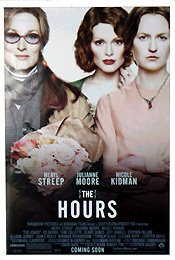Always The Hours....
 2002: Watched The Hours with Master Madcat and Master Chocoindryice. The movie left us pondering and debating what the story was about and what the messages were (albeit a confused Madcat who found it a little too literary and profound)
2002: Watched The Hours with Master Madcat and Master Chocoindryice. The movie left us pondering and debating what the story was about and what the messages were (albeit a confused Madcat who found it a little too literary and profound)2006: Watched The Hours on TV last night. Four years later, the theme and the plot take on a greater meaning.
For the transcript of the movie, go to: http://www.script-o-rama.com/movie_scripts/h/the-hours-script-michael-cunningham.html
Taking place over one day, the film is essentially about three women each suffering from depression. All three are battling with issues of freedom, responsibility and identity. All three stories are interconnected with the novel "Mrs Dalloway", as one is writing it, one is reading it, and one is living it:
Virginia Woolf, a real author, (Nicole Kidman) is starting to write her book 'Mrs. Dalloway' in 1923 England. She is coming to the realization of her lesbianism (in a time when it is not socially accepted) and fighting her pure despair of life and headaches. Eventually, Virgnia must face the decision to run away from her husband to London where the doctors also forbid her to go or stay with her beloved husband to fulfill her responsibility.
Laura Brown (Julianne Moore), is a mother fearing her ability to be a mother again. She is reading 'Mrs. Dalloway' in 1951 Los Angeles. The very pregnant Laura thinks she won't be an adequate mother to her daughter and current baby on the way in a few months. Laura must make the decision to run away from it all or live miserably with her happy husband. Given the era that she lives in and the "Pleasantville" mentality that a woman is only completely happy with a house, a happy husband and beautiful children, she dares not deviate from this social norm for fear of being an outcast.
Clarissa Vaughan (Meryl Streep) is a publisher living in present 2001 New York. Her nickname, given by her poet-friend, Richard, who is dying of AIDS, is Mrs. Dalloway. Clarissa is also throwing a party but for Richard who is receiving an award for his poetry. Like Virginia Woolf, Clarissa is also a lesbian but also wonders if she is in love with Richard with whom she once dated. She feels trapped and wants to be free from having to look after (and love) Richard, at the same time, she wants him to live on and can't help feeling for him.
At the end, the whole plot twists and comes together. It seems that Richard's mother is actually Laura Brown who left her family back then to escape from her depression. Sadly, it was revealed in the movie that her husband died of cancer, her daughter too died of an unknown cause, and her son (Richard) commited suicide (in the movie) for he dreaded his life as an AIDS patient. Perhaps, all these are repercussions of Laura's decision back then.
Having watched the movie, the questions and reflections remain....
1) Is it better to live your life for your own happiness or others?
2) If you do live for your own happiness, how would it affect others? Would you be considered a selfish person?
3) If you are not ready to be a good parent, you either don't be or learn how to be one. For how a child handles relationships and life (either now or in the future) is very much dependant on the manner in which his or her parents relate to him or her, like in the case of Laura Brown and her son, Richard.
So what should we do when we are faced with a dilemma of having to live your life for your own happiness or others? There are no fixed answers. I guessed you just have to decide it and not regret it or perhaps you can draw light from the ending of the movie The Hours when Virginia Woolf said:
to look life in the face,
always... to look life in the face...
and to know it... for what it is...
at last to know it...
to love it... for what it is...
and then...
to put it away.
always the years between us
always the years...
always the love...
always the hours...

0 Comments:
Post a Comment
<< Home